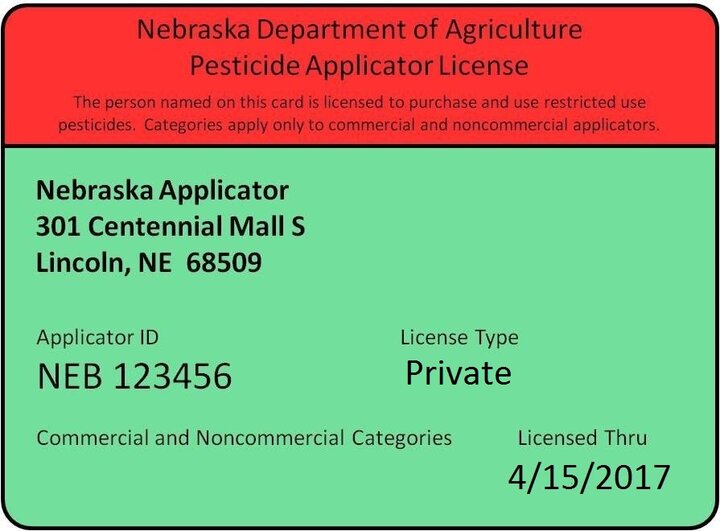Private pesticide applicators holding licenses that expire in 2017, as well as anyone seeking first-time private applicator certification, can contact their local Nebraska Extension office for pesticide safety education training sessions. About 200 statewide sessions will be held January through April.

After completing the Pesticide Safety Education Program training, licensed private pesticide applicators can buy and use restricted use pesticides in their farming operations. More than 10,400 private applicators statewide are eligible for recertification in 2017.
As farming and farming tools continue to become increasingly sophisticated, producers need new information, as well as refresher information, to help them make the best decisions for safety.
Nebraska producers are extremely knowledgeable and conscientious about safety and pesticides; the training serves as a reinforcement for all the techniques they are doing right, and boosts their understanding of some of the more technical aspects of pesticide safety.
New for 2017
Special emphasis this year will be on herbicide resistance and the newly revised federal Worker Protection Standards. Participants also will benefit from many other training topics, including pesticide drift, Nebraska pesticide laws and regulations, the pesticide label, personal safety, environmental protection, integrated pest management, pesticides and application, application equipment, and equipment calibration.
One key objective this year is to better understand how weeds become resistant to pesticides and how to manage resistant weeds and prevent resistance from developing in the future. Participants will use the 2017 Nebraska Guide for Weed, Disease and Insect Management (Nebraska Extension EC130) to learn how to use label information such as chemical group numbers as well as nonchemical techniques, to reduce development of pest populations resistant to pesticides. The comprehensive guide is included with registration.
Another new development for 2017 will be an overview of the newly revised federal Worker Protection Standards. Part of the revision goes into effect Jan. 1, 2017, and part goes into effect Jan. 1, 2018. One example is that aside from immediate family members, people under age 18 will no longer be able to handle (mix, load and apply) pesticides.
The revised federal law is designed to minimize contact and exposure to pesticides. Extension is helping Nebraska producers to be aware of these new regulations and how they can keep their employees even safer.
Who Needs to be Recertified?
Private pesticide applicators who need to be recertified in 2017 will be notified in two ways: through the Nebraska Department of Agriculture and through Nebraska Extension.
By mid-December, private applicators needing recertification in 2017 may expect a notification letter from NDA. The letter includes a bar code that eliminates the need to complete the standard NDA application form.
In addition, those eligible for recertification will be notified by their local Nebraska Extension office of recertification training sessions in their area.
Applicators should check their licenses for the expiration date. If the license expires in 2017 and they have not yet received a letter from NDA, contact the agency at 402-471-2351 or 877-800-4080.
Training Session Details and Costs
Schedule
PSEP private applicator training sessions, sites, and dates
Extension provides the educational training for recertification, while NDA is responsible for licensing. The cost of Extension training is $30 per person; NDA licensing is a separate fee.
For a list of training sessions, sites, and dates, contact the nearest Nebraska Extension office or go online to pested.unl.edu, where there is a link to the 2017 private pesticide training dates. That link shows education sites for private applicators listed by county.
Another option for becoming certified or recertified is completion of a self-study course. The course can be taken online or with a printed manual available at Extension offices. The online course can be purchased at marketplace.unl.edu in the Pesticide Education section. The cost for either self-study format is $60.
After completing private applicator training, certification applications will be sent to NDA, which will then bill the applicator for the state license fee.
For inclement weather and possible cancellations, listen to a local radio or television station, or call the training site.
For more information, visit pested.unl.edu.
